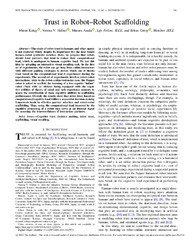Trust in robot–robot scaffolding
| dc.contributor.author | Kırtay, M. | |
| dc.contributor.author | Hafner, V. V. V. | |
| dc.contributor.author | Asada, Minoru | |
| dc.contributor.author | Öztop, Erhan | |
| dc.date.accessioned | 2024-01-29T08:57:36Z | |
| dc.date.available | 2024-01-29T08:57:36Z | |
| dc.date.issued | 2023-12-01 | |
| dc.identifier.issn | 2379-8920 | en_US |
| dc.identifier.uri | http://hdl.handle.net/10679/9108 | |
| dc.identifier.uri | https://ieeexplore.ieee.org/document/10014434 | |
| dc.description.abstract | The study of robot trust in humans and other agents is not explored widely despite its importance for the near future human-robot symbiotic societies. Here, we propose that robots should trust partners that tend to reduce their computational load, which is analogous to human cognitive load. We test this idea by adopting an interactive visual recalling task. In the first set of experiments, the robot can get help from online instructors with different guiding strategies to decide which one it should trust based on the computational load it experiences during the experiments. The second set of experiments involves robot-robot interactions. Akin to the robot-online instructor case, the Pepper robot is asked to scaffold the learning of a less capable 'infant' robot (Nao) with or without being equipped with the cognitive abilities of theory of mind and task experience memory to assess the contribution of these cognitive abilities to scaffolding performance. Overall, the results show that robot trust based on computational/cognitive load within a sequential decision-making framework leads to effective partner selection and robot-robot scaffolding. Thus, using the computational load incurred by the cognitive processing of a robot may serve as an internal signal for assessing the trustworthiness of interaction partners. | en_US |
| dc.description.sponsorship | Deutsche Forschungsgemeinschaft ; Japan Society for the Promotion of Science ; Osaka University | |
| dc.language.iso | eng | en_US |
| dc.publisher | IEEE | en_US |
| dc.relation.ispartof | IEEE Transactions on Cognitive and Developmental Systems | |
| dc.rights | openAccess | |
| dc.rights | Attribution 4.0 International | |
| dc.rights.uri | https://creativecommons.org/licenses/by/4.0/ | |
| dc.title | Trust in robot–robot scaffolding | en_US |
| dc.type | Article | en_US |
| dc.description.version | Publisher version | |
| dc.peerreviewed | yes | en_US |
| dc.publicationstatus | Published | en_US |
| dc.contributor.department | Özyeğin University | |
| dc.contributor.authorID | (ORCID 0000-0002-3051-6038 & YÖK ID 45227) Öztop, Erhan | |
| dc.contributor.ozuauthor | Öztop, Erhan | |
| dc.identifier.volume | 15 | en_US |
| dc.identifier.issue | 4 | en_US |
| dc.identifier.startpage | 1841 | en_US |
| dc.identifier.endpage | 1852 | en_US |
| dc.identifier.doi | 10.1109/TCDS.2023.3235974 | en_US |
| dc.subject.keywords | Cognitive load | en_US |
| dc.subject.keywords | Decision making | en_US |
| dc.subject.keywords | Robot trust | en_US |
| dc.subject.keywords | Scaffolding | en_US |
| dc.subject.keywords | Visual recalling | en_US |
| dc.identifier.scopus | SCOPUS:2-s2.0-85147278702 | |
| dc.relation.publicationcategory | Article - International Refereed Journal - Institutional Academic Staff |
Files in this item
This item appears in the following Collection(s)
Share this page




